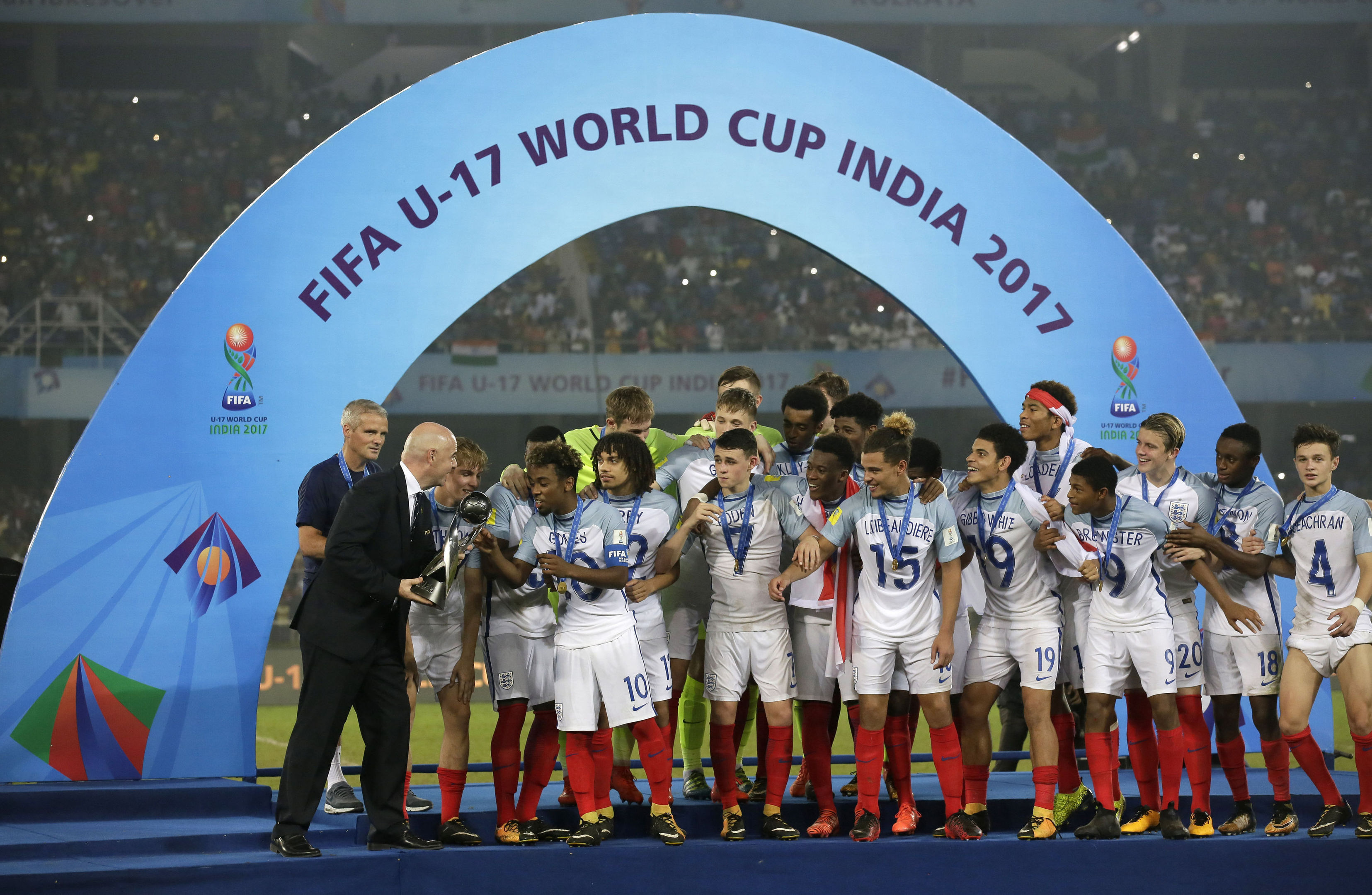
GARETH Southgate has issued a reminder to England’s victorious Under-17 squad that they are playing for the Three Lions on the front of their shirts, not the name on the back.
The country’s youngsters triumphed spectacularly last weekend when they won the World Cup in India, beating Spain 5-2 after being two goals down.
But the pictures of the players celebrating with their shirts on back to front hasn’t gone down too well with traditionalists, who viewed it as another example of the culture of the individual that’s now prevalent in the game.
The boss of the senior side doesn’t want to rain on their parade.
But Southgate has made it very clear that he would have preferred it hadn’t happened.
“People will have a different view on whether it matters or not,” said the England boss.
“I think that whether it’s your club or your country, it’s the badge on the front of the shirt you play for, not the name on the back.
“I balance that by remembering that they’re young kids in a real moment of ecstasy. Are they going to think logically about what they’re doing?
“What we hope in the future would be that the Three Lions is the more important thing. But I also understand that, in that moment, they’re not necessarily thinking about that.
“I think it’s a good thing to have this discussion with the young teams moving forward, and make it clear that we’re building for England.
“It’s about the team, winning together and having experiences together. It’s not about building up any one individual.
“Every club and every national team has great history. They’ve had great players before and will have great players in the future.
“If you’re going to be a top player, being selfless is important. As a group of national coaches, let’s make that point.
“We don’t want to beat those players with a stick because it was a real moment to celebrate.
“But humility is a really important trait for developing young players, as is recognising that you’re part of something bigger.
“Some of the Under-20s did it as well when they won their World Cup, so perhaps it’s generational.
“It’s something they will learn from. They’re young guys, and if that’s the worst thing they’ve done over the period of four weeks when they’ve been brilliant ambassadors for their country, then we can’t be too critical.
“Ideally, would they have done it? No. But what they’ve done in a positive way far outweighs that negative.”
Two World Cup wins at different age levels this year has questioned the notion that English players are in some way genetically incapable of handling tournament football.
Premier League Weekly: Southampton should be aiming to be the best of the rest
Southgate has never believed that cliche and he plays down any psychological barrier there might be when he takes his senior squad to Russia next summer.
“I helped build the programme used by the age-group teams, so we know what we’ve done and what’s worked,” he said.
“But it isn’t about a tournament. It’s about getting results against the best teams.
“Of course, if you’re more comfortable being away from home and you’re able to deal with that dynamic, that’s important.
“But what really matters is the confidence that comes from playing in big matches, and knowing how to win them.”
When Southgate named his squad for the two upcoming Wembley friendlies against Germany on Friday and Brazil the following Tuesday, there was a clear element of challenge to many of the players who had served him during the qualifying campaign.
Chris Smalling, Daniel Sturridge, Jermain Defoe and Alex Oxlade-Chamberlain were all missing as he introduced players from the upper age group teams, such as Tammy Abraham, Harry Winks, Ruben Loftus-Cheek and Joe Gomez.
He stresses that he’s shutting no doors, but the message is undeniable.
“I don’t think any of our players can feel comfortable that they’re a guaranteed selection,” said Southgate.
“Players are emerging all the time – technically good players, too.
“I took the job with the Under-21s because I believed that we had young English players who could play in a certain way.
“Someone once told me when we were playing Holland in an age-group game that they’d have more of the ball. I asked: ‘Hang on, why should that be the case?’.
“That is what we had to affect and, in every age group now, in most games we have more of the ball.
“That doesn’t mean you win the game, so we have to get every other aspect right.
“My belief was always that our young players could do things with the ball as well as any others can, and that’s now evidenced through all our age groups.
“The next stage is how do we take that into the first team? That’s my responsibility and that should be the strength of having the whole pathway joined up.
“What pleased people most about the Under-17s was that they played well and they also won.
“That’s absolutely the way we want to develop our teams, and that’s what we have to do at senior level.”

Enjoy the convenience of having The Sunday Post delivered as a digital ePaper straight to your smartphone, tablet or computer.
Subscribe for only £5.49 a month and enjoy all the benefits of the printed paper as a digital replica.
Subscribe